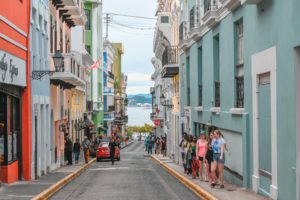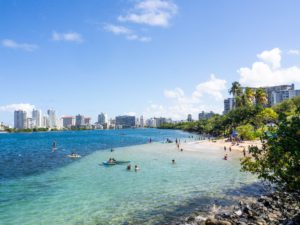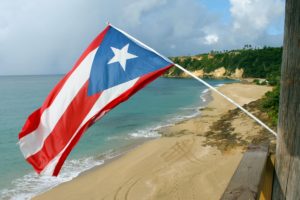Remote Seller Nexus Chart
This remote seller nexus chart lists the states that have passed one or more types of legislation regarding nexus.

After the Wayfair ruling, Puerto Rico enacted economic nexus laws that impose a sales tax collection and remittance obligation on remote sellers who have sufficient economic contact with the Island, even if that economic connection is their only contact. While Puerto Rico is not alone—every U.S. state and territory with a sales tax has enacted economic nexus rules—there are some additional nuances unique to the “Island of Enchantment.” Let’s have a brief look at economic nexus in Puerto Rico and discuss some practical tips for negotiating the complexity of sales tax compliance on the Island.

The Supreme Court in Wayfair held that it is constitutional for states to require out-of-state sellers to collect and remit state sales taxes, even if they have no physical presence in the state, provided the seller has sufficient connection to the state. This is called economic nexus. The court did not, however, opine on precisely what constitutes such a sufficient connection. The result has been a patchwork of legislation in the states defining various sales thresholds or volumes that constitute a sufficient connection for sales tax nexus. In Puerto Rico, there are several ways a business can create nexus.
Traditional physical presence nexus—when the business has employees or real estate on the Island—was not supplanted by economic nexus, and the two exist alongside one another. This isn’t anything new. Even having independent contractors in Puerto Rico can create nexus, if they solicit transactions for the benefit of said business and the gross income attributable to the contractors is more than $10,000 in the last 12 months. There is also “click-through” nexus, which is created when a business contracts with a resident of Puerto Rico to refer buyers to the business through a link on the resident’s website, provided the aggregate gross income attributable to all such contracts exceeds $10,000 in the last 12 months. There are more activities that have traditionally created non-economic nexus with Puerto Rico. In fact, it could be argued that some of those activities run right up to if not jump over the line of what can reasonably be considered physical presence nexus as required before Wayfair changed the landscape. Nonetheless, last year, Puerto Rico did adopt rules which squarely implemented an economic nexus standard.
As of January 1, 2021, businesses with over $100,000 in gross sales or at least 200 transactions in Puerto Rico in the seller’s accounting year (fiscal year) are required to register with the Hacienda (Puerto Rico’s Revenue Department) and to collect and remit sales taxes, even if the business has no other connection with the Island. This was a seismic shift for many businesses making sales into Puerto Rico as they now had to determine if they have nexus on the Island, register with the appropriate jurisdictions, and begin collecting, remitting, and reporting sales taxes. The good news is, with diligence and patience, the rules are eminently comprehensible, and there are myriad resources available to get, and stay, in compliance.

Even though Puerto Rico has numerous complexities, independent local nexus is not one of them. What this means for businesses is that the nexus determination is greatly simplified. If you have nexus anywhere on the Island, you have nexus everywhere. This doesn’t mean you automatically have to register in every locality, nor does it mean you can simply track total sales into Puerto Rico. It just means that you only need to keep track of one set of economic nexus thresholds. Once you’ve made $100,001 in sales or 200 transactions, you must register and begin collecting and remitting the tax in all localities in which you make sales. But where must you register and to whom must you remit?
Of Puerto Rico’s 11.5% combined sales and use tax (IVU, for impuesto sobre ventas y uso ) rate, 10.5% is administered by the Commonwealth. For this portion of the IVU, businesses must register with the Island’s Revenue Department, the Hacienda. This is accomplished through an online registration and filing system called the Sistema Unificado de Rentas Internas or SURI. The other 1% is a fixed local rate, which is administered by Puerto Rico’s 78 municipalities, or municipios.
SURI Basics
|
Before you worry too much about local filings, know that 71 of these municipalities administer their IVU through a centralized corporation called the Corporación de Financiamiento Municipal, or COFIM. Through the COFIM, businesses can register and file in all 71 member municipios with a single system. Unfortunately, the remaining seven municipalities administer their own IVU, and each imposes its own filing method. Those seven are: Bayamon, Canovanas (no online filing), Carolina, Guaynabo, Mayaguez (no online filing), San Juan, and Trujillo Alto. Depending on who you ask, you will get a different answer as to whether remote sellers with economic nexus into Puerto Rico need to register to remit with the COFIM and in these seven independent localities. Our understanding is that you do.
Generally, filings are due monthly on the 20th of the month for both the Hacienda and COFIM. Though “large contributors” (defined as a business or individual with monthly IVU obligations of $2,000 or more) must file with the Hacienda twice per month, before the 15 and before the 30. For the COFIM, filings are due monthly regardless of business volume.

In the end, despite the nuances, sales and use tax obligations in Puerto Rico are not that much more complicated than other U.S. jurisdictions. The obligations are certainly manageable, particularly when you consider the resources available to aid in compliance such as consultants, software providers and Puerto Rico-specific, Hacienda Certified Professionals.